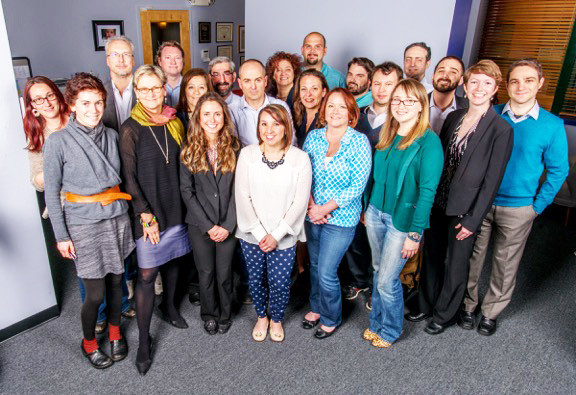EpiVax wins SBIR research award
New $600,000 grant validates the research by EpiVax to re-engineer protein sequences in vaccines to make the human immune system better able to detect and overcome stealth viruses
PROVIDENCE – EpiVax is a small Rhode Island firm with big ideas about how to redesign vaccines to make them more effective, engineering protein sequences in the vaccines to make the human immune system better able to detect and then overcome “stealth” camouflage in viruses such as influenza.
The innovative research platform developed by EpiVax has been validated in part with the award of new funding from the federal government.
On Monday, Sept. 12, the privately held company with 22 employees located in the former Jewelry District announced that it had won a $600,000 National Institutes of Health grant under the Small Business Innovation Research program to improve the vaccine for the problematic H7N9 influenza virus, according to the news release.
The vaccine development program will be directed by Dr. Annie De Groot, CEO and chief scientific officer at EpiVax, and Lenny Moise, Ph.D., director of Vaccine Research at EpiVax.
The work will be done in collaboration with Ted Ross, Ph.D., director of the Center of Vaccines and Immunology at the University of Georgia.
Attacking stealth viruses
The work builds upon previous research conducted by EpiVax in collaboration with Vaxine, an Australian firm, and Protein Sciences in Connecticut. The first version of an optimized influenza vaccine designed by EpiVax will soon enter a Phase I clinical trial in Australia.
As the news release detailed, H7N9 influenza has earned the moniker of a “stealth virus” for its ability to evade the human immune response, both in natural-occurring infections and in vaccine formulations. As a result, H7N9 vaccines developed using conventional methods have significantly underperformed in the clinic. [See link to ConvergenceRI story below.]
Under the new SBIR-funded avian influenza research program, EpiVax and its collaborators aim to re-engineer H7N9 viral proteins so that they can be more easily detected by the immune system, resulting in a more potent vaccine product.
“We are pleased to work with EpiVax in exploring the potential of immune engineering,” said Manon Cox, the CEO of Protein Sciences. The company is the manufacturer of Flublok, the only FDA-approved recombinant influenza vaccine. [See link to ConvergenceRI story below.]
The announcement was validating and comforting, according to De Groot, who first learned about the company’s success in securing the research grant from Sen. Sheldon Whitehouse.
“It has been a struggle to convince our peers at NIH and on the review committee that the protein engineering that we’ve been doing can be applied to vaccines,” De Groot told ConvergenceRI. “This award is a validation of our approach.”
The recognition has been “a long time coming,” De Groot continued, because people were skeptical at first that these modifications would improve the efficacy of vaccines. “A tip of the hat to the NIH peer reviewers,” she said.
De Groot said that the research had also been validated in different research laboratories – in Providence, in Florida, and in Japan.
Potential impact on other vaccines
De Groot said that the team at EpiVax was working with HIV and malaria vaccines, to see if “we can improve the vaccines by re-engineering the proteins to be more immunogenic.”
De Groot called the research work on re-engineering proteins in vaccines a “paradigm shifting area of research.”
“We’re not a big company; we’re 22 people,” she continued. “That this research is finally getting recognition around the globe, even though we’re a small Rhode Island company,” De Groot said, is important. “People are finally listening to the work that we’re doing here in Rhode Island.”
In addition to the federal award, De Groot said that she was awaiting the announcement expected this week by CommerceRI on additional state matching funds for SBIR award winners in Rhode Island.







